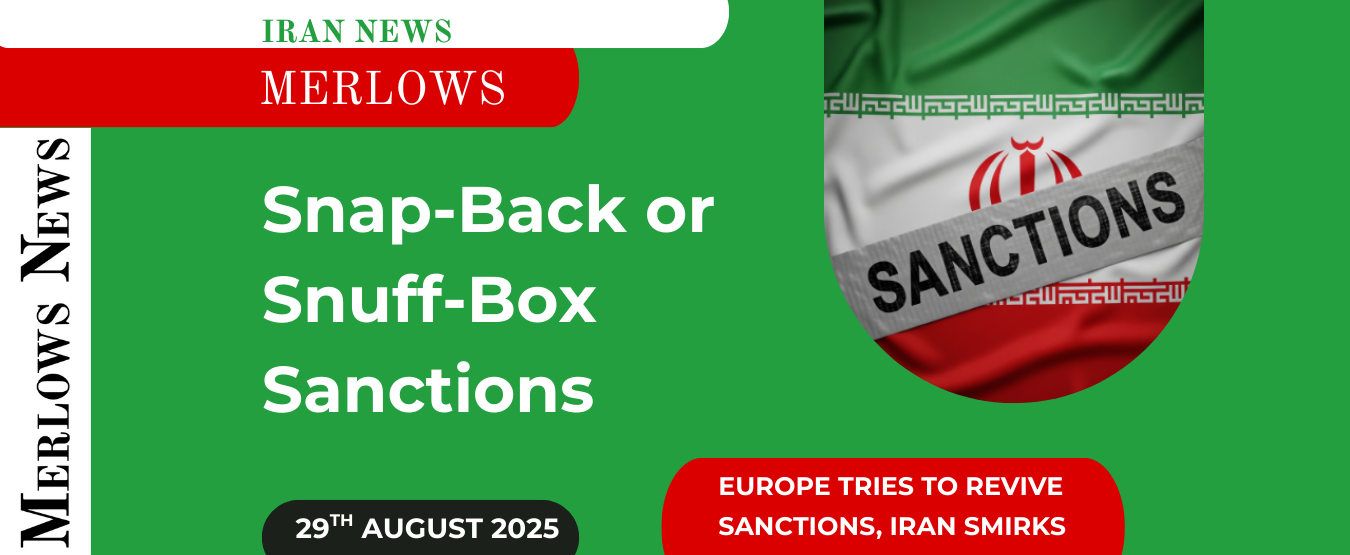Europe dusted off the “snap-back” sanctions mechanism in June, hoping to rein in Tehran. But the ayatollahs responded with the same contempt they’ve shown for decades: laughter in public, enrichment in private.
In a Nutshell
On 28 June 2025, the UK, France, and Germany announced they were triggering the so-called “snap-back” provision of the 2015 nuclear deal, formally reinstating sanctions against Iran for breaching its commitments. The move was meant to signal strength, a reminder that Europe still had tools of leverage.
Tehran responded with fury but not fear. Officials declared they would cut all cooperation with the International Atomic Energy Agency (IAEA), accelerate enrichment, and continue their missile program. In short: the regime shrugged.
Source: AP News, 28 Jun 2025
The Main Course
The nuclear file has always been theatre. In 2015, Barack Obama and European leaders hailed the JCPOA as historic, a breakthrough that would halt Iran’s nuclear ambitions. In reality, it was a pause button at best, a blank cheque at worst. Billions in frozen assets were released. Iran returned to oil markets. And what did it do with its windfall? It armed Hezbollah, expanded into Syria, and bankrolled the Houthis.
Now, a decade later, Europe dusts off the “snap-back” clause like an antique found in the attic. It is meant to look decisive, yet it reeks of desperation. Sanctions have been tried before, and Iran has endured them with grim efficiency. The people suffer, the regime survives, and the centrifuges keep spinning.
What makes this round particularly hollow is timing. Tehran has just faced Israeli strikes, domestic unrest, and open dissent. A regime truly on the ropes might have been pressured into compromise. Instead, Europe delivers sanctions with one hand while keeping the other firmly in the pocket of appeasement, terrified of confrontation.
The result? The ayatollahs smirk, confident that Europe’s stomach for real enforcement is as weak as ever.
The Media Recommends
The Associated Press spoke of “a major rebuke to Tehran.”
Source: AP News
The BBC framed it as “Europe’s bid to preserve peace.”
The Guardian, predictably, warned that sanctions would “harm ordinary Iranians” as though the regime’s theft and corruption were irrelevant.
The coverage misses the point. Sanctions without teeth are not peace; they are paperwork. And paperwork never stopped a centrifuge.
The Merlow View
History shows us that sanctions only work when paired with resolve. The Allies’ blockade of Germany in 1914 weakened the Kaiser because it was enforced to the bitter end. Sanctions on apartheid South Africa mattered because they came alongside global political isolation. In contrast, decades of sanctions on Saddam Hussein only entrenched his rule, impoverishing Iraqis while leaving the Ba’ath Party intact.
Iran is closer to Saddam than to South Africa. The Revolutionary Guards profit from black markets. Smugglers enrich themselves. The clerical elite lives in comfort while ordinary Iranians face shortages. Sanctions, absent pressure, strengthen the regime’s grip.
The fantasy is that Europe’s snap-back will change Tehran’s calculus. The reality is that only decisive confrontation diplomatic, economic, and military has ever shifted Iran’s behaviour. Until Europe admits this, sanctions are theatre. And Tehran knows it.
The invitation is simple: do not mistake the paperwork of sanctions for the reality of power. Tehran smirks because it knows Europe prefers theatre to confrontation. To see this clearly is to understand that until the regime is faced with consequences it cannot smirk away, snap-backs are little more than snuff-boxes — ornaments on a shelf, admired but useless.







Share this: